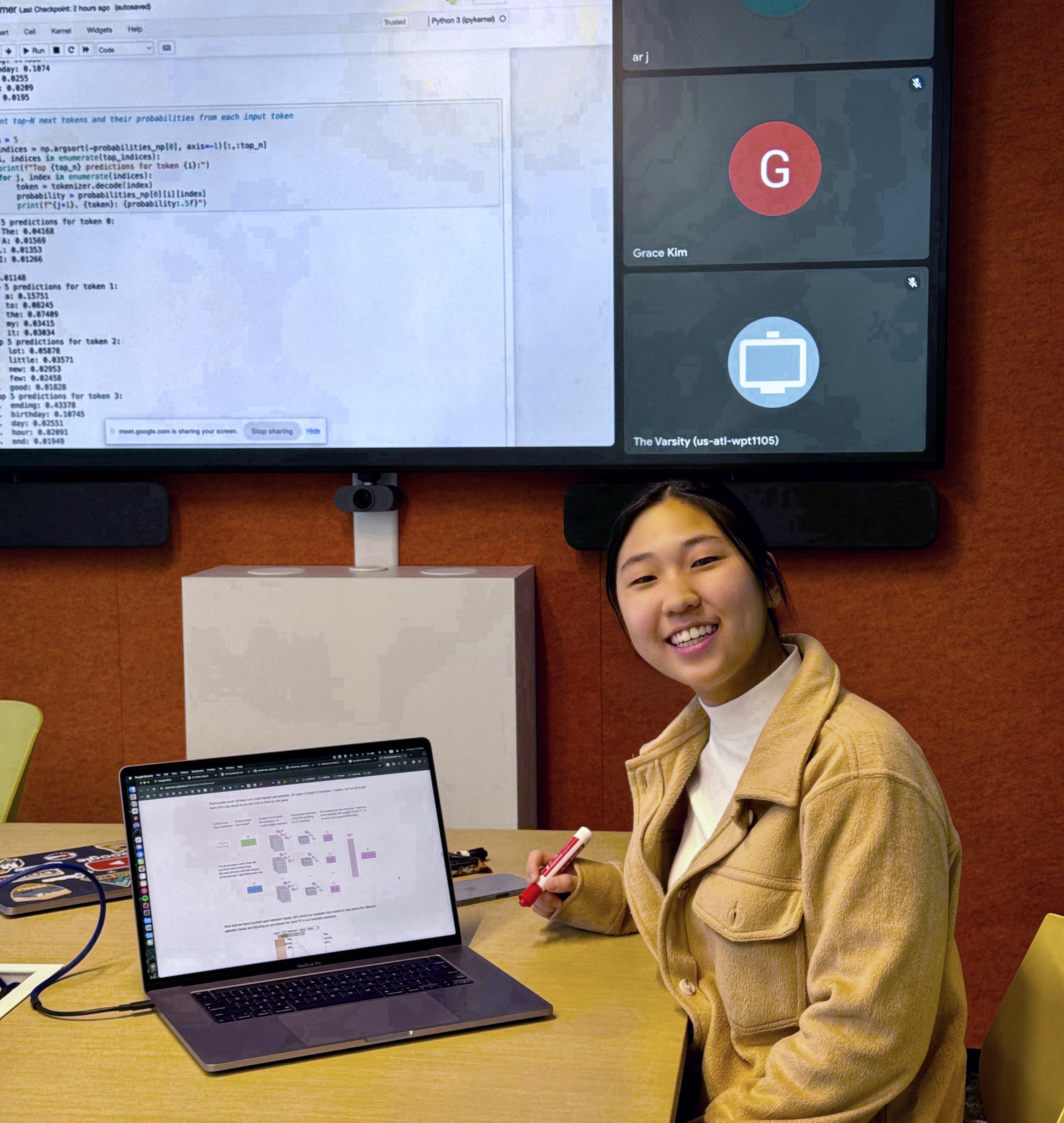Grace Kim is a 2nd-year computer science major studying human-centered AI with Dr. Betsy DiSalvo and Dr. Polo Chau.

How long have you been an undergraduate researcher at Georgia Tech?
I began my second year in Fall 2023!
How did you get involved with undergraduate research?
During the summer after my first year, I participated in the GT College of Computing’s Berlin study abroad program. There, I enrolled in four computer science classes, including Computing and Society. I broadened my understanding of the societal impacts of technology – especially as I took the class in Europe, where there seems to be a heavier emphasis on the subject withstricter regulations governing technology.
Upon returning, I joined the DataWorks Lab, a human-centered computing lab, under the mentorship of Annabel Rothschild, who had been my teaching assistant for the study abroad and was looking to take on undergraduate research assistants. In the lab, I focus on responsible AI from a social science perspective, studying the societal impacts of AI systems.
While I study the social science side of AI, I’m also interested in the theoretical and technical sides – as a computer science major with threads in AI and Theory. I’d like to combine my interests by bringing the human dimension to computing and developing AI systems that are aligned with user needs and values. This led me to also join Dr. Polo Chau’s lab, which combines machine learning and human-computer interaction to create a visual understanding of AI, machine learning, and large datasets. Through this lab, I aim to develop my skills in creating visual explanations for AI systems to make them understandable and transparent to humans, therefore improving public trust in these technologies.

What are you working on?
In Dr. Betsy DiSalvo’s lab, I’m leading a project on the carbon footprint of AI. AI has a significant environmental impact, as it requires substantial amounts of energy and other resources like water for training and operation. After conducting a comprehensive literature review, we found that existing directives often target stakeholders in isolation, leading to a disconnect and lack of collaborative efforts among them. For example, policymakers and machine learning practitioners are considered independently due to their conflicting priorities. We aim to bridge this gap by first presenting a summary of prior work, enabling stakeholders to view and understand each other’s concerns in one place. We then propose methods to facilitate communication and collaboration among these stakeholders. Through this paper, we hope to encourage a transition toward adopting a collaborative approach to finding sustainable solutions.
In Dr. Polo Chau’s lab, I’m working with a team to develop an interactive tool for visualizing the transformer architecture, which is used in machine learning for understanding and generating human language. My responsibilities included contributing to the development of the project proposal, conducting a literature review (which involved reading papers and noting pros/cons of existing tools), extracting and analyzing model parameters to dissect the transformer’s inner workings, and finding ways to visualize them.
What is your favorite thing about research/researching?
Participating in undergraduate research enabled me to see firsthand how Georgia Tech is impacting its local Atlanta community and the world!
Through the DataWorks Lab, I’ve had opportunities to attend local events and engage with industry/academia researchers, practitioners, nonprofit founders, and policymakers who address responsible AI from different angles, entering the world of responsible AI.
In Dr. Polo Chau’s lab, my team is aiming to make the best transformer explainer in the world, and I hope this tool becomes an essential resource for students and NLP enthusiasts, in addition to practitioners who want to understand the inner workings of their machine learning models. I’m excited about the potential of this project to meet an essential need and generate widespread excitement!

What are your future plans and how has research influenced them?
I received the DAAD RISE scholarship to return to Germany and intern there this summer! I’ll be joining an international team of machine learning researchers at the CISPA Helmholtz Center for Information Security to study privacy-preserving data generation through large language models.
The diverse opportunities offered at Georgia Tech influenced my future plans. I plan to complete my BS/MS at Georgia Tech and pursue a Ph.D. in machine learning. My education in computer science equips me with theoretical knowledge and technical skills, while my research in AI/ML through a humanistic lens helps me contribute to the design of user-centric AI systems. I hope to combine my passions for machine learning, human-computer interaction, and human-centered computing to become a well-rounded machine learning researcher who understands both the technical and societal aspects of AI, advancing human-centered AI and contributing meaningfully to the field.
